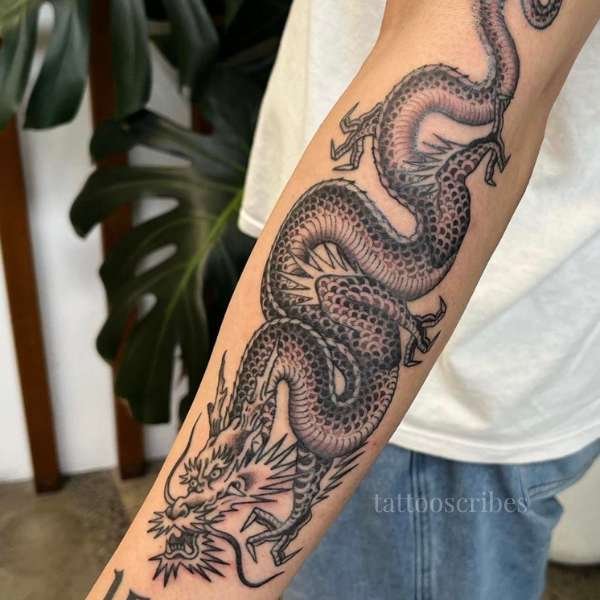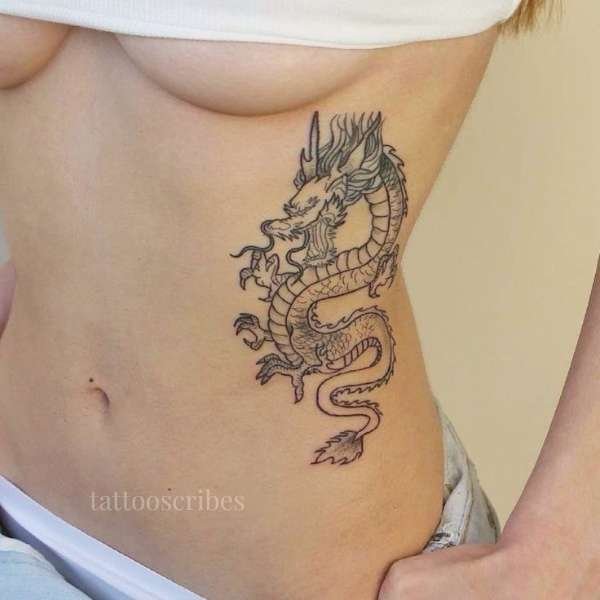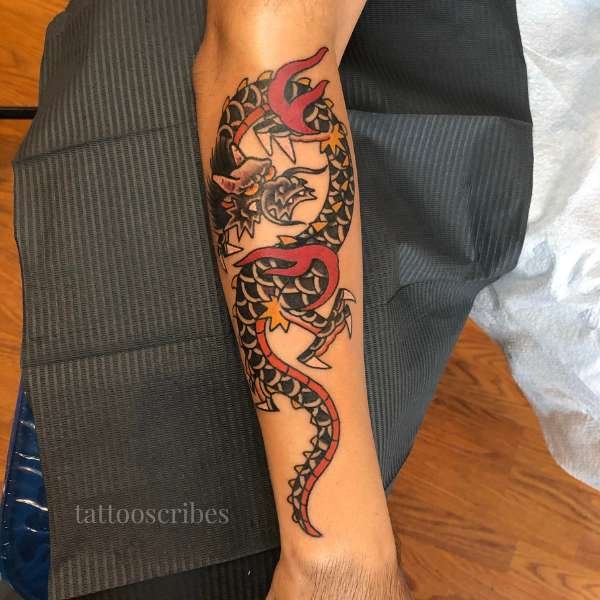A Japanese dragon tattoo is popular and known for its powerful symbolism and deep meaning.
The tattoo represents strength, wisdom, and protection, often depicted with vibrant colours that hold specific tattoo colour meanings.
Whether it’s your first tattoo or a meaningful addition, this Japanese tattoo’s symbolism can serve as a reminder of personal growth.
Explore different tattoo designs and the cultural significance behind these majestic creatures.

What Does a Japanese Dragon Tattoo Mean?
A Japanese dragon tattoo meaning reflects courage, wisdom, and spiritual protection. It embodies the guardian energy of dragons in Japanese folklore—creatures seen not as destroyers but as protectors that bring balance and good fortune to those they guide.
General Symbolism of Japanese Dragon Tattoos
- Strength – Dragons symbolize immense power used for good rather than destruction.
- Wisdom – Represents intelligence, maturity, and thoughtful leadership.
- Protection – Acts as a shield against evil and misfortune.
- Balance – Unites fire and water, symbolizing inner harmony.
- Prosperity – Invites abundance and success into one’s life.
You may also like below posts:

Cultural Meanings of Japanese Dragon Tattoos
- Mythological Origins – Dragons are revered kami (spirits) in Japanese Shinto and Buddhist traditions.
- Imperial Symbol – Represents authority and guardianship over the nation.
- Water Guardian – Associated with rain, rivers, and life-giving energy.
- Spiritual Balance – In Zen philosophy, dragons signify mastery over chaos.
- Samurai Connection – Warriors used dragon imagery to invoke courage and moral power.
Japanese Dragon Tattoo Variations and Designs
- Ryu Dragon Tattoo – The most common, symbolizing power and good fortune.
- Black Dragon – Wisdom and experience.
- Blue Dragon – Calmness, forgiveness, and compassion.
- Red Dragon – Passion, strength, and emotional intensity.
- Gold Dragon – Wealth, prosperity, and divine energy.
- Dragon with Koi Fish – Transformation through perseverance.
- Dragon with Tiger – Balance between strength and courage.
Learn more about selecting the perfect artist here.

Other Symbolic Meanings of Japanese Dragon Tattoos
- Rebirth – Rising from struggle stronger than before.
- Spiritual Awakening – Awareness of life’s deeper truths.
- Masculine Energy (Yang) – Power and confidence balanced with restraint.
- Connection to Nature – Harmony with water, wind, and earth elements.
- Protection from Evil – Acts as a guardian spirit watching over you.
Discover more aftercare tips here.

Meaningful Placement Ideas
- Back – Full-body guardianship and inner power.
- Arm or Sleeve – Continuous strength and courage on display.
- Chest – Protects the heart and symbolizes personal honor.
- Leg – Represents forward motion and purpose in life’s journey.
- Neck or Shoulder – Spiritual awareness and leadership energy.
Frequently Asked Questions
Are Japanese dragon tattoos good or evil?
They’re good—symbols of protection, wisdom, and prosperity in Japanese culture.
What does a black Japanese dragon tattoo mean?
It represents wisdom, experience, and resilience.
Can women get Japanese dragon tattoos?
Yes, they can represent empowerment and inner strength.
What direction should the dragon face?
Traditionally upward for growth and protection, downward for introspection.
What’s the difference between Japanese and Chinese dragon tattoos?
Japanese dragons have three claws (symbol of balance), while Chinese dragons often have five (imperial power).
What colors are most common?
Gold, red, and black—each tied to different symbolic meanings.
Last word
Incorporating a Japanese dragon tattoo means more than just embracing a stunning design.It’s about connecting with rich symbolism, personal meaning, and a cultural legacy.
With the right design, placement, and care, your tattoo can become a lasting reminder of strength, wisdom, and protection.
